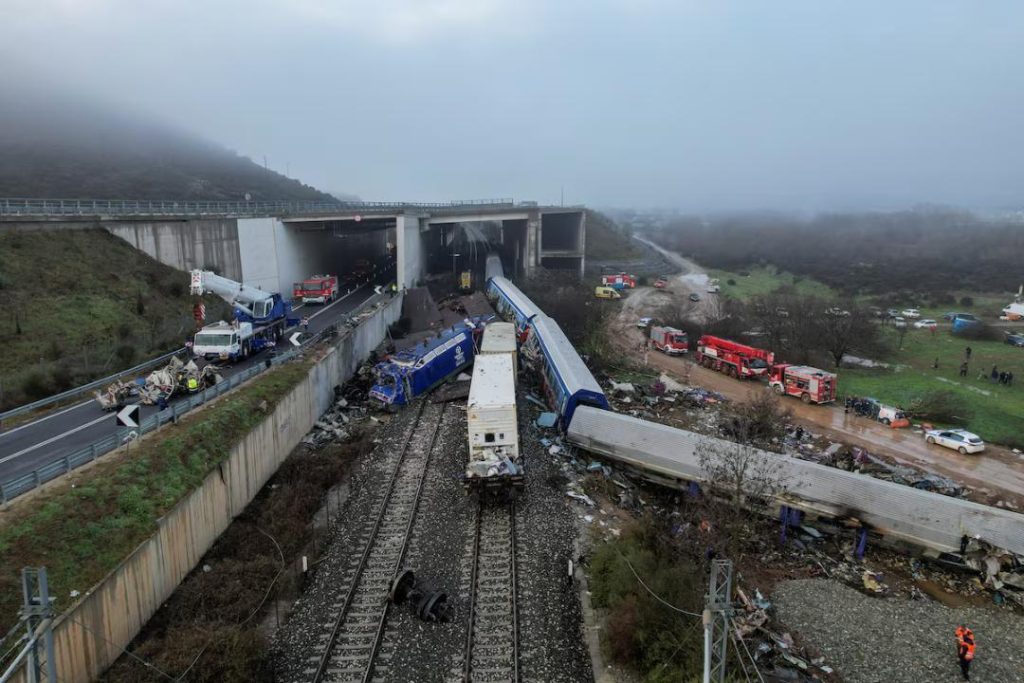
Train Crash Killed 57; Greek Finds Safety Gaps After Two Years
Two years have passed since the devastating train crash in Greece that claimed the lives of 57 people, mostly students. The tragedy occurred on a busy railway line in the country, leaving families and friends in shock and grief. The investigation into the cause of the crash has finally concluded, and the findings are shocking. According to the Greek inquiry, the disaster was caused by “chronic safety gaps” that had been ignored for years.
On February 27, 2025, a passenger train collided with a freight train head-on, leading to a massive explosion that engulfed the vehicles. The impact was catastrophic, resulting in the deaths of 57 people, with most victims dying in the crash itself. Up to seven more people lost their lives in the subsequent fire that engulfed the wreckage.
The investigation into the crash has been ongoing for two years, with investigators pouring over evidence and interviewing witnesses. The findings have been nothing short of damning, revealing a series of systemic failures and safety lapses that contributed to the disaster.
At the heart of the problem is the chronic underinvestment in Greece’s rail infrastructure. The country’s rail network has been in dire need of modernization and upgrading for years, but successive governments have failed to prioritize the issue. The result is a network of outdated and poorly maintained tracks, signals, and equipment, which is a recipe for disaster.
The investigation also highlighted serious lapses in safety protocols and procedures. The passenger train was traveling at a speed of over 100 km/h when it collided with the freight train, which was stationary on the track. The speed limit on the section of track where the crash occurred was 80 km/h, but the train was traveling significantly faster.
But the investigation did not stop at the immediate cause of the crash. It also examined the broader safety culture within Greece’s rail network, and the findings were alarming. Investigators found that there was a pervasive culture of complacency and lack of accountability within the network, with many employees prioritizing efficiency and productivity over safety.
The investigation also revealed that there were multiple warnings and alerts that were ignored in the days leading up to the crash. These included reports of brake failures, signaling issues, and maintenance delays, but these were dismissed or ignored by authorities.
The findings of the investigation are a stark reminder of the importance of prioritizing safety in the rail industry. The crash was a preventable tragedy that was caused by a combination of systemic failures, complacency, and lack of accountability.
In the aftermath of the crash, Greece’s transportation minister has promised to take swift action to address the safety gaps identified by the investigation. This includes a significant investment in the country’s rail infrastructure, as well as reforms to the safety culture within the network.
The families of the victims of the crash are deeply disappointed by the findings of the investigation, but they are relieved that the truth has finally been revealed. They are calling for justice and accountability, and for the government to take concrete action to prevent such a tragedy from occurring again.
The crash has also raised questions about the accountability of those responsible. The investigation has identified multiple individuals and organizations that failed to act on warnings and ignored safety protocols, but it remains to be seen whether anyone will be held accountable.
The train crash in Greece is a sobering reminder of the importance of prioritizing safety in the rail industry. The crash was a preventable tragedy that was caused by a combination of systemic failures, complacency, and lack of accountability. It is only by learning from this tragedy that we can prevent similar disasters from occurring in the future.






